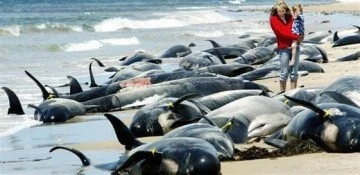While super quiet sea kayaks are now accused of being a threat to orca whales in the San Juan Islands by a misguided and misinformed National Marine Fisheries Service (NMFS), the same agency remains silent about the US Navy plans to increase ocean warfare training and testing of new sonar devices in the killer whales’ home waters.
The Navy readily admits that their testing and training affects 2.3 million marine mammals each year in the United States, ranging from seals and sea lions to dolphins and whales. Several endangered species and populations such as our resident killer whales have already been affected by testing. The new plans to expand the coastal ranges where the tests occur is expected to affect an additional half million marine mammals.
The high intensity sonar’s effect on marine mammals has been shown to interrupt normal feeding and resting, to cause significant injuries to ears and brains, and even cause death.

Federal records show that since 2000 there have been four mass strandings of whales on beaches due to Navy sonar. Nevertheless, the Navy insists these are minor and temporary problems that do not warrant any precautions.
Most biologists believe that the Navy is underestimating the effects, especially in the long term. So far, environmentalist groups’ legal attempts to curtail the high-intensity sonar testing have been met with rejection by the courts. Even requests that the testing be moved to locations outside of established marine sanctuaries have been rejected. Over 3500 public comments in opposition to the navy testing in the Olympic Coast National Marine Sanctuary have been received by the federal government to no avail.
And once again, NFMS, the federal agency in charge of protecting the orca whales from the real threats that include declining salmon, elevated toxin levels, and brain-hemorrhaging sonar, prefers to focus its attention and our tax dollars on the dangers of sea kayak tours in the San Juan Islands. Talk about a red herring! Be sure to write to NMFS orca.plan@noaa.gov and tell them they need to get to work on the real issues that threaten the survival of killer whales and that you support the environmentally-benign practice of using non-polluting and silent kayaks in their home waters.
